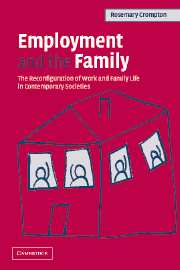Book contents
- Frontmatter
- Contents
- Preface
- 1 Understanding change in employment, family and gender relations
- 2 Caring and working
- 3 Women, men, organisations and careers
- 4 Work–life articulation, working hours and work–life policies
- 5 States, families and work–life articulation
- 6 Households, domestic work, market work and happiness
- 7 Class, family choices and women's employment
- 8 Conclusions
- Appendix A Additional ISSP Family 2002 questions
- Appendix B Joseph Rowntree Foundation (JRF) interviewees cited
- Bibliography
- Index
5 - States, families and work–life articulation
Published online by Cambridge University Press: 22 September 2009
- Frontmatter
- Contents
- Preface
- 1 Understanding change in employment, family and gender relations
- 2 Caring and working
- 3 Women, men, organisations and careers
- 4 Work–life articulation, working hours and work–life policies
- 5 States, families and work–life articulation
- 6 Households, domestic work, market work and happiness
- 7 Class, family choices and women's employment
- 8 Conclusions
- Appendix A Additional ISSP Family 2002 questions
- Appendix B Joseph Rowntree Foundation (JRF) interviewees cited
- Bibliography
- Index
Summary
In Chapter 4, it has been argued that contemporary managerial and labour force policies in the US and the UK are serving to increase work intensity as well as working hours. All other things being equal, these kinds of employment policies will be likely to make the practicalities of work–life articulation more difficult. It has been argued that these kinds of pressures are a consequence of managerial approaches influenced by neoliberal thinking, that seek to increase productivity by reducing the ‘porosity’ of the working day via a number of strategies. These include reducing the numbers of employees, removing or modifying entitlements to paid overtime, introducing targets for employee performance, and tightly scheduling worker availability to meet peaks and troughs of demand. Simultaneously, employers may also seek to enhance employee ‘commitment’ by offering a series of benefits that can include generous work–life policies. However, case study and other evidence suggests that many employees do not feel able to take advantage of these policies because of increasing workplace pressures. In Britain and the US, governments have imposed relatively few restraints on employers and managers' ‘right to manage’. Indeed, the lack of regulation of the British and American labour markets is often contrasted (favourably) with the ‘over-regulated’ European norm. However, state policies (or regulation) have a significant impact on the structuring of both gender and class, as well as work–life articulation.
- Type
- Chapter
- Information
- Employment and the FamilyThe Reconfiguration of Work and Family Life in Contemporary Societies, pp. 115 - 138Publisher: Cambridge University PressPrint publication year: 2006



